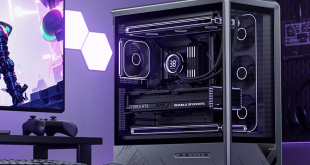To access the inside of the case, the thumbscrews securing the side panels in place must first be removed. The side panels themselves feature some thin noise dampening material which should help reduce the noise level of this case.
When the side panel has been removed, the two hard drive caddies also have to be removed to access the insides. These are each secured by two thumbscrews, a regular screw and a plastic clip. We found the plastic clip to be quite flimsy as it snapped off during removal. This isn't really an issue, though, as the screws are more than enough to hold the caddies into place.
Due to the side-mounted hard drive caddies, there is plenty of room to work with inside the case as the usual space is empty. This will also facilitate airflow through the chassis. Evo Labs have opted for a top-mounted power supply bracket which works well with the design of the case. Installing the power supply is quite simple, but we have to first remove a re-enforcing bracket from the case.
Unfortunately, there isn't any room behind the motherboard tray for cable routing. This can create quite a mess of cables in the chassis if you're not extremely careful when building a system in the case.
Installing a motherboard is very simple as the stand-offs are all pre-installed. We chose to install a mini-ITX motherboard as we didn't have a micro-ATX model available at the time of review. With such compact motherboards, you need to be quite selective about which CPU cooler you choose to use as some can prove incompatible with other components.
Evo Labs have thoughtfully included a cut-out section in the motherboard tray to facilitate the installation of a CPU cooler backplate.
It's nice to see Evo Labs including a tool-less mechanism for securing expansion devices in the case, however it's pretty much useless in practice. We would highly recommend using screws to secure your graphics card into place as the clips wouldn't secure properly with our dual-slot AMD Radeon HD 7950 graphics card.
Installing a solid state drive or hard drive is simple. They need to be screwed down to one of the two caddies which are mounted just inside the side panel.
 KitGuru KitGuru.net – Tech News | Hardware News | Hardware Reviews | IOS | Mobile | Gaming | Graphics Cards
KitGuru KitGuru.net – Tech News | Hardware News | Hardware Reviews | IOS | Mobile | Gaming | Graphics Cards











That is a really nice little case for the price. my mate is looking for one, ive emailed him this link as he is a tightarse and doesnt like spending money on a case or a power supply
some compromises obviously at this price but its quite good looking. certainly better than the thermaltake crap I have bought around £50 in the past.